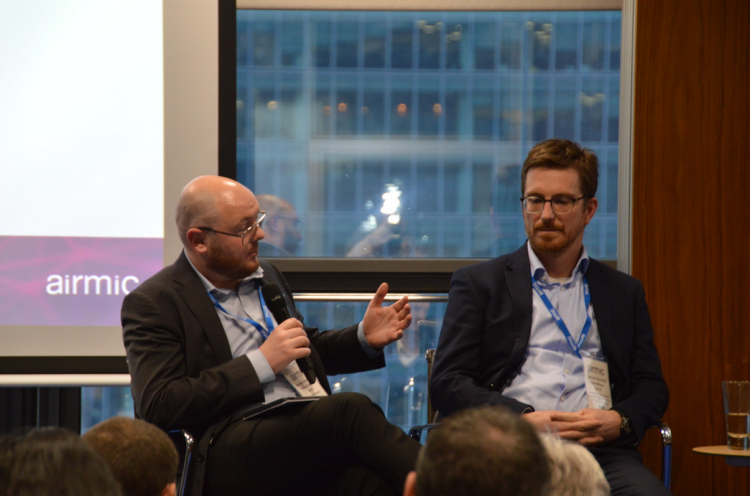The 2024 Airmic Captives Forum – 6 March at Lloyd’s

What a day!
The programme at the third Airmic Captives Forum did not disappoint. With a capacity attendance of 200, feedback was ‘good’ or ‘very good’. Of course, we can always do better, and Airmic has a list of subjects for the next Forum booked to take place at Lloyd’s on 5 March 2025.
This event has one of the highest percentage attendances of Airmic members and almost 100 were there in March.
The 2023 Airmic Captive Governance publication produced in partnership with Aon – A Practical Guide for Independent Non-Executive Directors on Captive Boards – was mentioned in the feedback as the hard copies available on the day were quickly snapped up – if you would like to download a copy, please go here: Airmic-Captive-Governance-Guide-INEDs.pdf
Presenting to a packed room, the opening keynote panel session moderated by Paul Eaton, CEO of Artex International, addressed a packed room. He said the captive domicile landscape in Europe should become more competitive, be collaborative and contain more options, should legislative and regulatory efforts across the continent and the UK continue to progress.
Representatives from AMRAE, the risk management association of France, ANRA, the risk management association of Italy, and the London Market Group (LMG) discussed the status of efforts in each of their home countries in implementing a new captive regime.
In December, Airmic welcomed the news that the UK government would hold a Spring consultation on a potential new captive framework. A consultation has yet to be published by government.
Caroline Wagstaff, CEO of the LMG, has led the lobbying efforts with the UK government said at the Captives Forum the UK was “at the beginning of the journey.” Airmic and a number of Airmic members have been active in offering their support.
“There has been a lot of interest in a captive regime,” she added. “It’s the last piece of the toolkit for London, the world’s largest insurance market.”
The UK captive market, led by the LMG, has approached the government a number of times this year about introducing a regime.
It follows similar moves in France last year that saw the passing of the 2023 Budget, which includes provisions for introducing a new captive regime in that country.
At the date of the Forum, France now has 16 active captives and there is believed to be plenty more in the pipeline to be established in 2024. The majority of these captives are new and not re-domestications from existing domiciles.
“We had to explain to the French Ministry that captives were not a ‘tax play’, but rather a better form of risk management,” said Brigitte Bouquot, president of the newly launched French Captive Federation.
In Italy there is no dedicated captive regime, but at the end of 2023, two existing Italian-owned captives did re-domesticate from the Netherlands and Ireland respectively.
Carlo Cosimi, president of ANRA, said a dedicated and clear captive regime is needed to attract more Italian captive and encourage new formations for businesses who do not want to utilise an international jurisdiction.
The panellists all agreed that while there may be some new and increased competition between new and established domiciles, cooperation and collaboration should be fostered and encouraged to push the development and “mainstreaming” of captives forward.
Bouquot added: “There should be cooperation not competitiveness between European domiciles, due to the need to raise capital to fund risk.”
